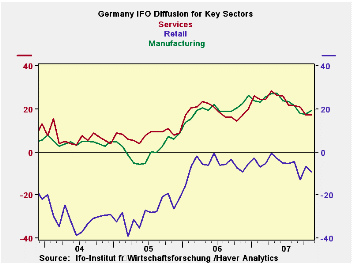 Global| Nov 30 2007
Global| Nov 30 2007IFO Index Continues to Slip; Components Show Weakness
Summary
The IFO released its survey detail for its sector results previously announced for November. The IFO headlines are dropping steadily and consistently. Manufacturing, while showing some bounce in other recent surveys, is giving off [...]

The IFO released its survey detail for its sector results previously announced for November. The IFO headlines are dropping steadily and consistently. Manufacturing, while showing some bounce in other recent surveys, is giving off strings of negative readings that reflect diminished growth from one year ago and fading prospects. In fact the IFO activity response is weaker Y/Yr for three months running. Demand is off for at least five months running. ‘Foreign orders on hand’ has been the slowest series to react but it is now down Yr/Yr for two months in a row.
The current situation is evaluated as steady for the last two months running. It remains in nearly the top 5% of the range for current situation historically. But business expectations continue to erode. They are still in the top one third of their range, but barely.
In the outlook for the next three months conditions are slipping. Retail orders expectations are erratically moving lower although this month interrupted a two month period of severe Yr/Yr drops. Wholesaling is however weakening rapidly and severely compared to its year ago levels. Export business expectations are consistently weaker than they were a year ago. Employment expectations continue to improve. Surely if the other trends are valid, that one can’t last.
| IFO Survey: Germany | ||||||||
|---|---|---|---|---|---|---|---|---|
| Percent: Yr/Yr | INDEX NUMBERS | |||||||
| Nov-07 | Oct-07 | Sep-07 | Aug-07 | Jul-07 | Current | Average | %tile | |
| Biz Climate | -2.5% | -1.5% | -0.9% | 0.7% | 0.8% | 104.2 | 95.8 | 81.0% |
| Current Situation | -3.1% | -2.1% | -1.3% | 2.5% | 2.4% | 110.4 | 94.9 | 84.8% |
| Biz Expectations: Next 6-Mos | -2.0% | -0.7% | -0.4% | -1.1% | -0.9% | 98.3 | 96.7 | 67.3% |
| Manufacturing: | Nov-07 | Oct-07 | Sep-07 | Aug-07 | Jul-07 | Current | Average | %tile |
| Current Situation | ||||||||
| MFG | 0.0% | 0.0% | 0.8% | 4.4% | 4.4% | 111.1 | 92.5 | 94.8% |
| Biz Expectations: Next 6-Mos | ||||||||
| MFG | -2.9% | -2.4% | -1.5% | -1.9% | -0.5% | 97.3 | 96.5 | 67.1% |
| Activity (m/m) | ||||||||
| MFG | -3.2% | -5.3% | -4.5% | 1.0% | -1.8% | 101.7 | 97.0 | 72.8% |
| Demand M/M | ||||||||
| MFG | -5.6% | -8.4% | -6.4% | -2.8% | -3.3% | 99.2 | 97.1 | 61.9% |
| Orders on hand | ||||||||
| MFG | -4.7% | -7.9% | -4.6% | -2.4% | -2.7% | 101.1 | 96.5 | 68.9% |
| Foreign orders on hand | ||||||||
| MFG | -1.9% | -0.4% | 0.5% | 2.5% | 2.0% | 109.7 | 94.7 | 91.7% |
| Yr/Yr percentage changes in underlying Indices | ||||||||
| IFO outlook for 3-Months ahead | ||||||||
| 3-Mos ahead | Percent: Yr/Yr | INDEX NUMBERS | ||||||
| Expected Activity | Nov-07 | Oct-07 | Sep-07 | Aug-07 | Jul-07 | Current | Average | %tile |
| MFG | -2.3% | -1.9% | -1.0% | 2.4% | 1.0% | 101.3 | 96.8 | 85.6% |
| Orders expectations | Changes over 12-months | |||||||
| Retail Orders | 4.0% | -12.0% | -8.0% | 3.0% | 4.0% | -8.8 | -17.7 | 76.8% |
| Wholesale | -10.0% | -12.0% | -13.0% | -5.0% | -5.0% | 5.5 | -13.8 | 80.2% |
| EXPORT Biz Expectations | ||||||||
| MFG | -3.3% | -3.8% | -2.4% | -0.1% | -0.9% | 103.1 | 98.5 | 87.7% |
| Employment Expectations | ||||||||
| MFG (Since June 1997) | 1.6% | 1.6% | 3.1% | 3.1% | 6.2% | 105.5 | 96.1 | 97.7% |
Robert Brusca
AuthorMore in Author Profile »Robert A. Brusca is Chief Economist of Fact and Opinion Economics, a consulting firm he founded in Manhattan. He has been an economist on Wall Street for over 25 years. He has visited central banking and large institutional clients in over 30 countries in his career as an economist. Mr. Brusca was a Divisional Research Chief at the Federal Reserve Bank of NY (Chief of the International Financial markets Division), a Fed Watcher at Irving Trust and Chief Economist at Nikko Securities International. He is widely quoted and appears in various media. Mr. Brusca holds an MA and Ph.D. in economics from Michigan State University and a BA in Economics from the University of Michigan. His research pursues his strong interests in non aligned policy economics as well as international economics. FAO Economics’ research targets investors to assist them in making better investment decisions in stocks, bonds and in a variety of international assets. The company does not manage money and has no conflicts in giving economic advice.
More Economy in Brief
 Global| Feb 05 2026
Global| Feb 05 2026Charts of the Week: Balanced Policy, Resilient Data and AI Narratives
by:Andrew Cates






